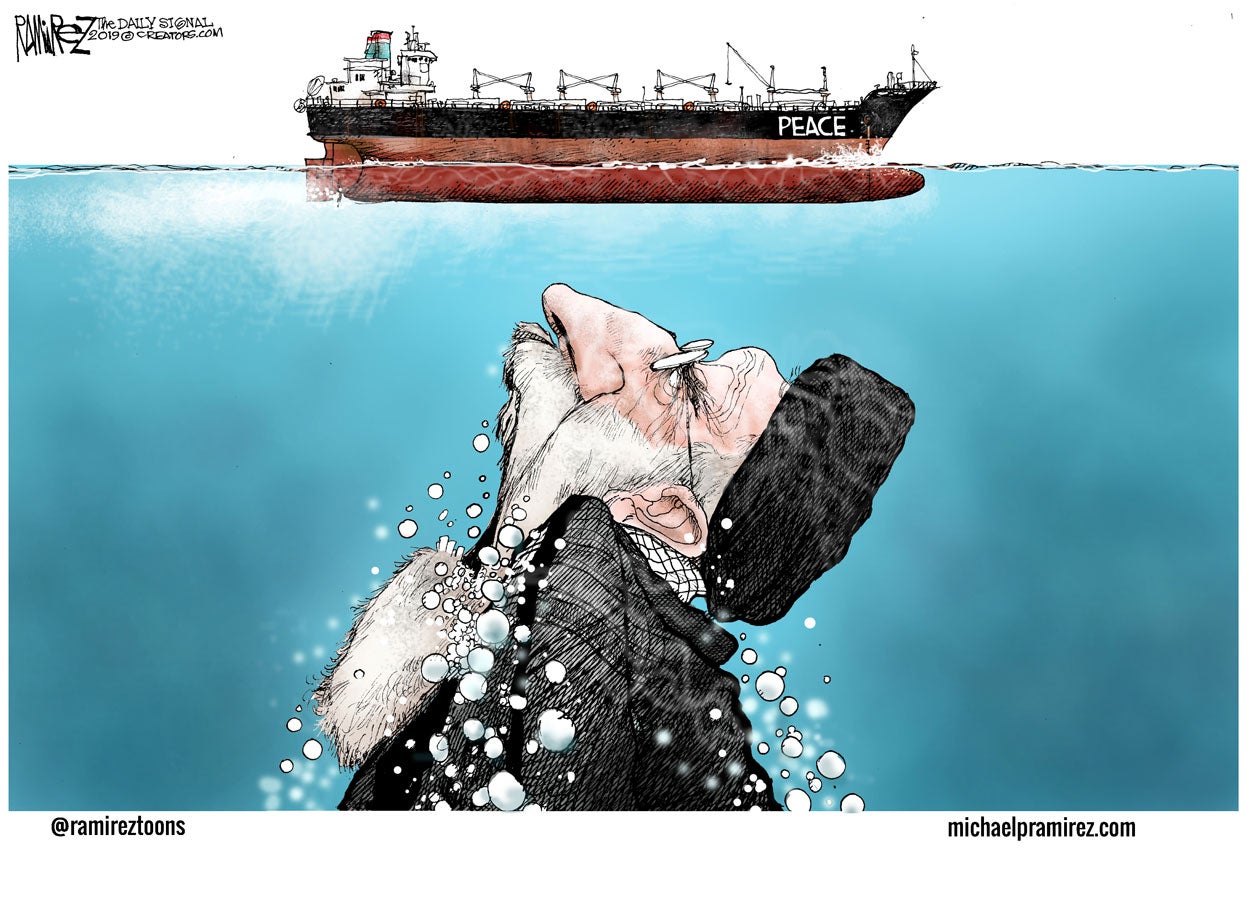Bret Stephens NYTs: The Pirates of Tehran
On April 14, 1988, the USS Samuel B. Roberts, a frigate, hit an Iranian naval mine while sailing in the Persian Gulf. The explosion injured 10 of her crew and nearly sank the ship. Four days later, the U.S. Navy destroyed half the Iranian fleet in a matter of hours. Iran did not molest the Navy or international shipping for many years thereafter. Now Iran's piratical regime is back yet again.
While Iran categorically denied responsibility for Thursday's attacks on two tankers in the Gulf of Oman, the evidence against Iran is compelling. The U.S. Central Command noted that "a U.S. aircraft observed an IRGC Hendijan-class patrol boat and multiple IRGC fast attack craft...in the vicinity of the M/T Altair," one of the damaged tankers.
Staging deniable attacks that fall just below the threshold of open warfare on the U.S. is an Iranian specialty. But it would require a large dose of self-deception to pretend that Iran isn't the likely culprit, or that its actions don't represent a major escalation. Firing on unarmed ships in international waters is a direct assault on the international order. To allow it to go unpunished isn't an option.
The U.S. should declare new rules of engagement to allow the Navy to engage and destroy Iranian ships or fast boats that harass or threaten any ship, military or commercial, operating in international waters. The world cannot tolerate freelance Somali pirates. Much less should it tolerate a pirate state seeking to hold the global economy hostage through multiplying acts of economic terrorism.
Nobody wants a war with Iran. But not wanting a war does not mean remaining supine in the face of its outrages. We sank Iran's navy before. Tehran should be put on notice that we are prepared and able to do it again.
Iran says it will break nuclear deal’s uranium stockpile limit in 10 days
Iran will break the uranium stockpile limit set by its nuclear deal with world powers in the next 10 days, the spokesman for the country’s atomic agency said Monday, while also warning that Iran has the need for uranium enriched up to 20 percent, just a step away from weapons-grade levels.Netanyahu urges world to reimpose sanctions if Iran ramps up nuclear enrichment
The announcement indicated Iran’s determination to break from the 2015 accord, which has steadily unraveled since the Trump administration pulled America out of the deal last year and reimposed tough economic sanctions on Iran, sending its economy into freefall.
The spokesman for Iran’s nuclear agency, Behrouz Kamalvandi, made the announcement during a press conference with local journalists at Iran’s Arak heavy water facility that was carried live on Iranian state television.
“Today the countdown to pass the 300 kilograms reserve of enriched uranium has started and in 10 days time we will pass this limit,” he said, putting the date for the breach of a key provision of the agreement at June 27.
The development comes in the wake of suspected attacks on oil tankers last week in the region, attacks that the US, the UK and Saudi Arabia have blamed on Iran and which Iran has suggested were carried out by the US. It also follows four other oil tanker attacks off Fujairah in recent weeks. Iranian-allied rebels from Yemen have also struck US ally Saudi Arabia with drones and missiles.
Prime Minister Benjamin Netanyahu on Monday urged the international community to immediately snap back sanctions on Iran if it goes ahead with its threat to enrich uranium beyond the levels set by a landmark nuclear pact.
Iran said earlier Monday that it would break the uranium stockpile limit set by the 2015 accord in 10 days, and warned that Iran could enrich uranium up to 20 percent — just a step away from weapons-grade levels.
Netanyahu, one of the agreement’s most vociferous critics, said Israel was not surprised by the threat.
“In the event it acts upon its threats and violates the nuclear deal, the international community must immediately impose the sanctions that were set previously. Israel will not allow Iran to obtain a nuclear weapon,” he said at the President’s Residence in Jerusalem, during a ceremony that commemorated Israeli presidents and prime ministers who have passed away.
The nuclear deal has steadily unraveled since the Trump administration pulled America out of the accord last year and re-imposed tough economic sanctions on Iran, deeply cutting into its sale of crude oil abroad and sending its economy into freefall.
The Monday announcement by Behrouz Kamalvandi, timed for a meeting of EU foreign ministers in Brussels, put more pressure on Europe to come up with new terms for the nuclear deal.
Europe has so far been unable to offer Iran a way around the US sanctions, and Netanyahu has urged other powers to follow the lead of the US and pull out of the deal as well.











































